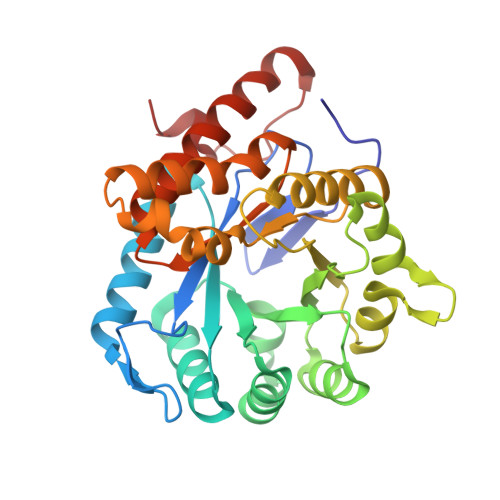Structures in Tetrahydrofolate Methylation in Desulfitobacterial Glycine Betaine Metabolism at Atomic Resolution.
Badmann, T., Groll, M.(2020) Chembiochem 21: 776-779
- PubMed: 31518049
- DOI: https://doi.org/10.1002/cbic.201900515
- Primary Citation of Related Structures:
6SJ8, 6SJK, 6SJN, 6SJO, 6SJP, 6SJR, 6SJS, 6SK4 - PubMed Abstract:
Enzymes orchestrating methylation between tetrahydrofolate (THF) and cobalamin (Cbl) are abundant among all domains of life. During energy production in Desulfitobacterium hafniense, MtgA catalyzes the methyl transfer from methylcobalamin (Cbl-CH 3 ) to THF in the catabolism of glycine betaine (GB). Despite its lack of sequence identity with known structures, we could show that MtgA forms a homodimeric complex of two TIM barrels. Atomic crystallographic insights into the interplay of MtgA with THF as well as analysis of a trapped reaction intermediate (THF-CH 3 ) + reveal conformational rearrangements during the transfer reaction. Whereas residues for THF methylation are conserved, the binding mode for the THF glutamyl-p-aminobenzoate moiety (THF tail) is unique. Apart from snapshots of individual reaction steps of MtgA, structure-based mutagenesis combined with enzymatic activity assays allowed a mechanistic description of the methyl transfer between Cbl-CH 3 and THF. Altogether, the THF-tail-binding motion observed in MtgA is unique compared to other THF methyltransferases and therefore contributes to the general understanding of THF-mediated methyl transfer.
- Center for Integrated Protein Science Munich (CIPSM), Department of Chemistry, Technische Universität München, Lichtenbergstrasse 4, 85748, Garching, Germany.
Organizational Affiliation:


















